|
Getting your Trinity Audio player ready...
|
Blockchain has a lot to offer governments looking to improve efficiency and accountability, and legislators are taking notice. While these words have recently become common in headlines, thanks to Elon Musk and the new Trump Administration’s DOGE, states like Virginia have been exploring the tangible benefits of blockchain technology for some time. A recent example is Virginia’s Legislative Blockchain Showcase, held in Richmond on February 6, 2025, sponsored by the BSV Association (BSVA) and the Virginia Blockchain Council (VBC).
A delegation from the BSV ecosystem attended the event, which included teams from CERTIHASH, SmartGrow Agritech, WeatherFlow Tempest, SmartLedger Solutions, and DataBird Drone Solutions, among others from the broader blockchain industry.
Numerous members of Virginia’s General Assembly, along with legislative staffers, temporary aides, and interns, attended the event in the General Assembly building at the state capitol. The open-door format encouraged ongoing engagement throughout the day.
Alexander Mann represented the BSVA as a Public Policy and Affairs Associate and also as the founder of SmartGrow Agritech, an agribusiness startup based in Harrisonburg in the Shenandoah Valley. He described the day as “a pivotal opportunity to connect real-world blockchain applications with policymakers actively shaping the future of the industry.”
“There is a growing legislative appetite for blockchain-based solutions,” said CERTIHASH’s Bryan Daugherty. “This showcase was a key step in fostering deeper collaboration between lawmakers and industry leaders.”
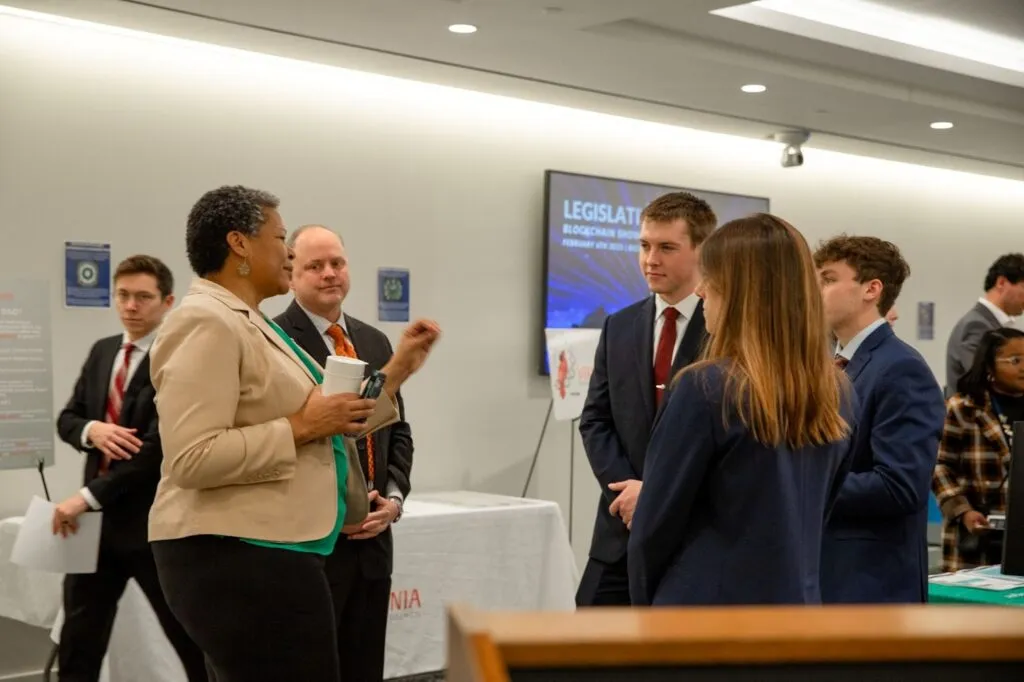
Virginia’s legislative leadership in blockchain
Virginia’s legislature has taken the lead with a proactive approach toward blockchain technology. This includes enacting several foundational policies in recent years, such as:
- SB 339 (2024): Directs the Joint Commission on Technology and Science (JCOTS) to analyze and make recommendations regarding the use of blockchain technology, digital asset mining, and cryptocurrency in the Commonwealth. The Commission is required to submit its findings to the relevant House and Senate Committees by December 1, 2024.
- SB 439 (2024): Mandates JCOTS to examine the expansion of blockchain technology and cryptocurrency in the Commonwealth and consider the creation of a Blockchain and Cryptocurrency Commission.
- HB 1796 (2025): Known as the “DAO Bill,” this legislation aims to provide a regulatory framework for decentralized autonomous organizations (DAOs) within the state.
Regulatory Sandbox and Blockchain Mining Bills: These bills facilitate innovation by allowing blockchain startups to operate under relaxed regulations for a limited time, fostering growth while ensuring consumer protection.
The JCOTS Blockchain Subcommittee itself was a direct result of ongoing legislative efforts, and the event represented a continuation of Virginia’s broader public-private collaboration in shaping blockchain policy. This mutual understanding of needs and capabilities leads to best practices, ensuring blockchain delivers on promises of data integrity, increased transparency, accountability, and efficiency across various sectors.
The Legislative Blockchain Showcase featured a diverse group of legislators, industry experts, and advocacy leaders, including key policymakers such as State Senator Saddam Salim (sponsor of the Blockchain & Cryptocurrency Commission bill) and Delegates Michelle Maldonado, Terry Kilgore, and Dan Helmer. Kilgore played a significant role in endorsing the event and reserving the Senate committee room where the showcase was held in the General Assembly building at the State Capitol.
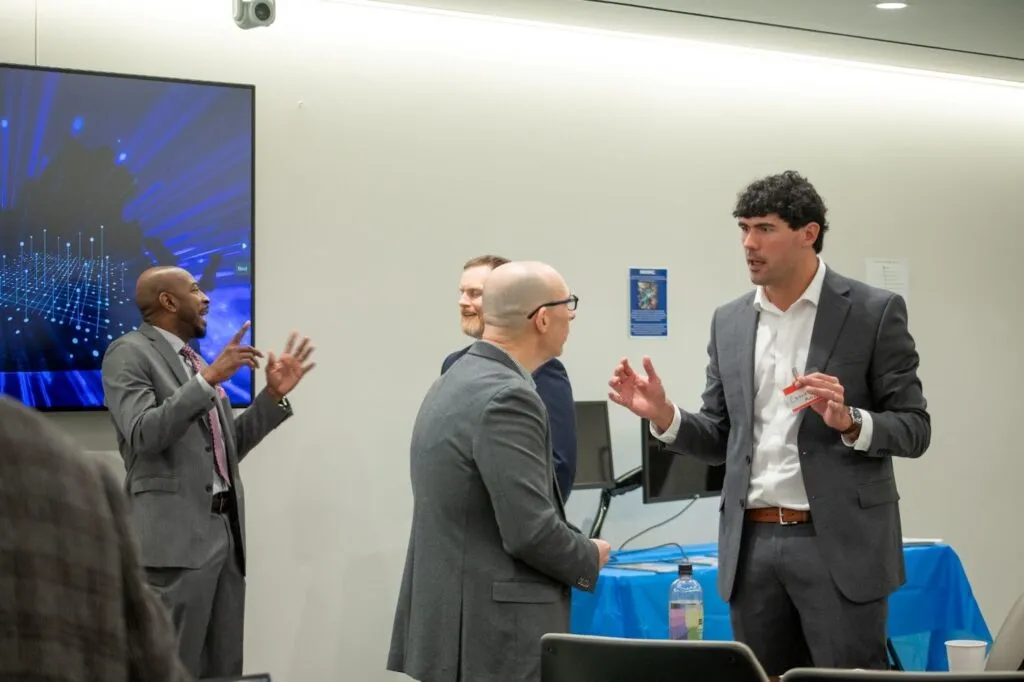
Evolving attitudes toward blockchain
Legislators’ perspectives on blockchain technology have evolved significantly. While early years were marked by hesitation due to the “cryptocurrency craze,” there is now a genuine commitment to understanding, adopting, and leveraging blockchain technology.
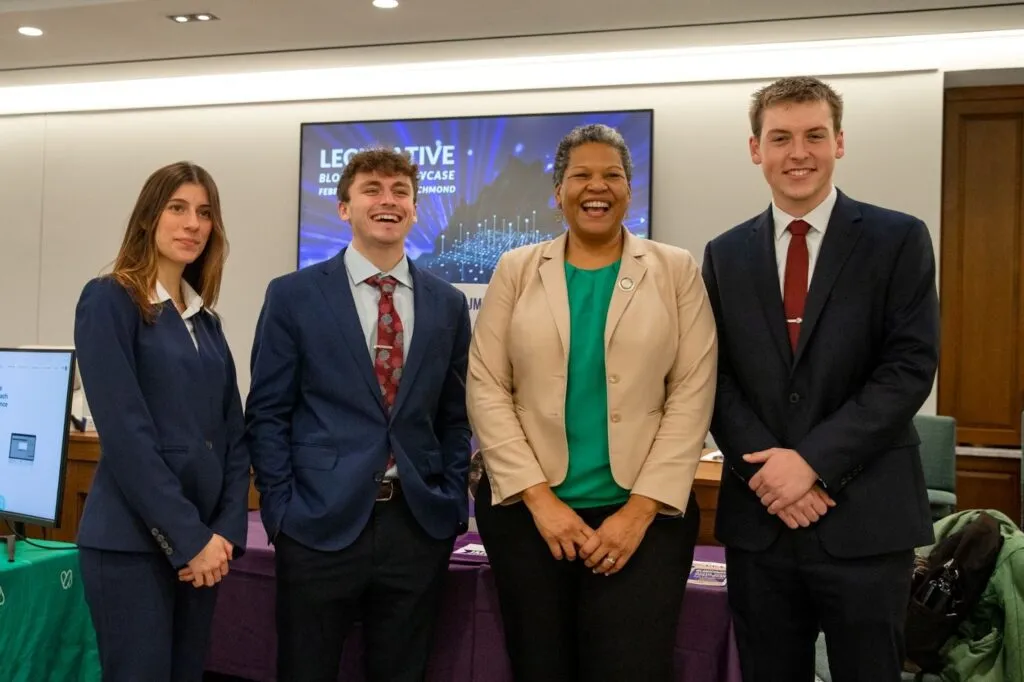
“We found there is still a lot to demystify when it comes to blockchain technology. There is a fundamental disconnect between crypto (ticker) and blockchain (protocol),” said Mann. “Events like these can help break down mental barriers and facilitate engaging conversations, which is so important in the fast-moving emerging tech space.”
Discussions at the showcase delved into technical, solution-driven inquiries about how blockchain can effectively address real-world challenges. When implemented correctly, blockchain technology can reduce fraud, enhance efficiencies, and drive innovation across various sectors, including private businesses and government operations.
The enthusiasm and investment in blockchain policy discussions set the stage for continued advocacy, legislative action, and real-world implementation. This event marks the beginning of a concerted effort to integrate blockchain solutions into the fabric of Virginia’s public and private sectors.
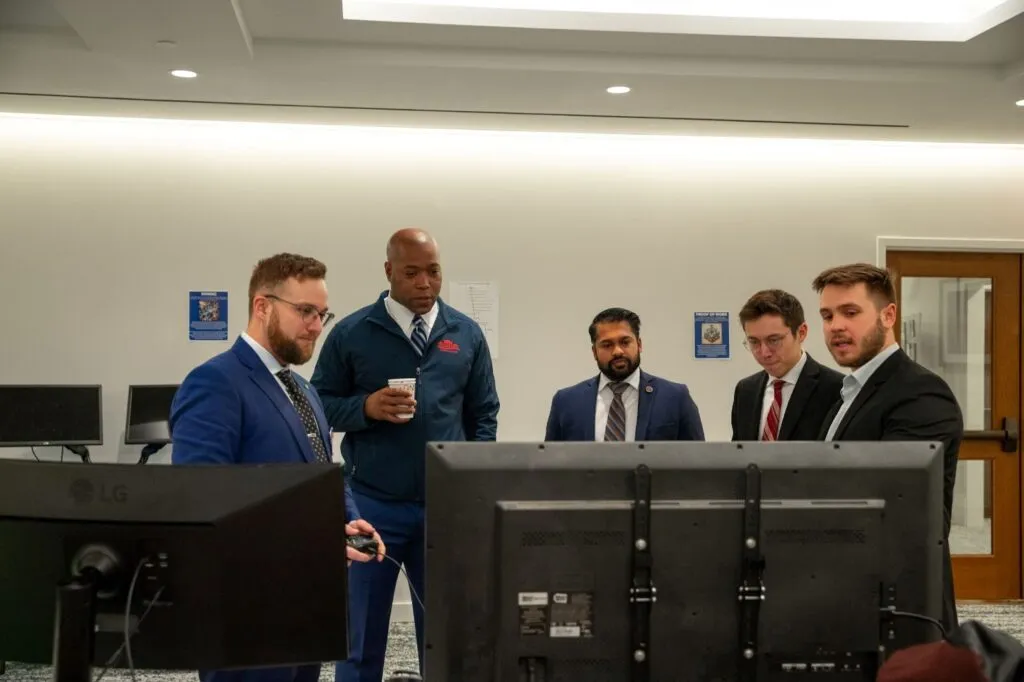
Recognizing key participants and use cases
The showcase highlighted cutting-edge blockchain implementations from a diverse set of industry leaders:
- SmartGrow Agritech featured a functional demo hashing real-time weather data from a WeatherFlow Tempest station directly to the BSV blockchain as part of its alliance partnership exploring blockchain IoT utility. This demonstrated how blockchain can provide immutable weather records for agricultural risk assessment and forecasting.
- SmartLedger Solutions showcased their enterprise cybersecurity product CERTIHASH and Sentinel Node, developed in collaboration with IBM (NASDAQ: IBM). Attendees experienced hands-on hashing and network security demonstrations, illustrating how blockchain enhances cybersecurity resilience and threat detection.
- DataBird Drone Solutions delivered one of the most interactive exhibits, featuring a real-time LiDAR Point Cloud digital twin of a power line run. Their artificial intelligence (AI)-powered Neural Network process, Gaussian Splatting, allowed attendees to navigate through a 3D digital twin model using an Xbox controller. This technology, with its hashed model weights stored on-chain, has significant implications for utility companies that rely on processed data for critical field operations, demonstrating the potential for blockchain-enhanced infrastructure management.
- The James Madison University (JMU) Blockchain Club played a key role in hands-on student-led blockchain innovation, engaging in active research and industry collaboration, reinforcing Virginia’s leadership in blockchain education and workforce development.
Mann, who has also served as COO of the Virginia Blockchain Council, played a key role in organizing the event and has been instrumental in advancing Virginia’s blockchain-related legislative efforts, a key role in organizing the event.
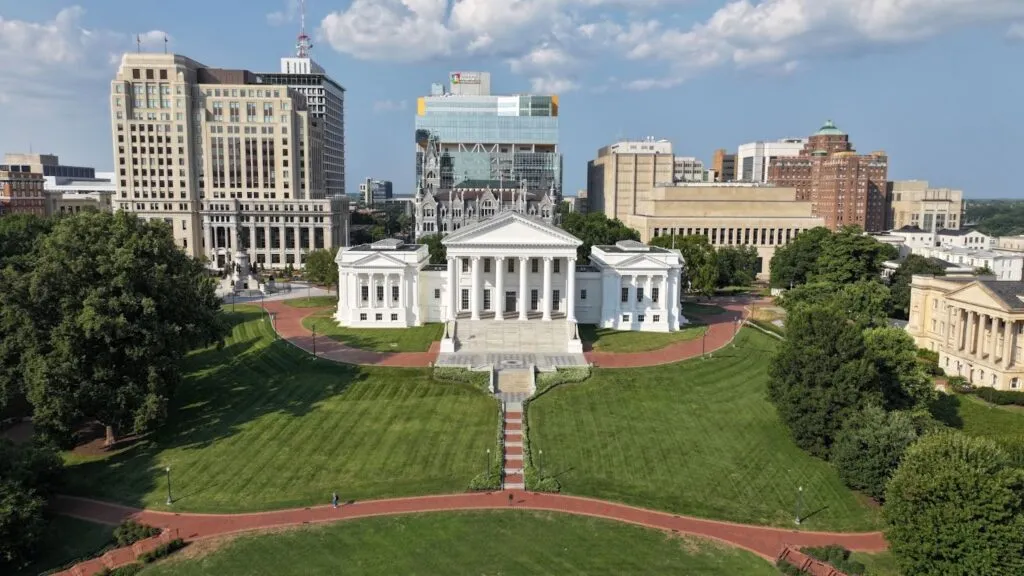
Expanding blockchain advocacy beyond virginia
Virginia’s General Assembly, established in 1619 and now over 405 years old, is the oldest elected legislative body in the United States and has played a crucial role in pioneering blockchain policy.
The BSVA highlighted the benefits of BSV’s upcoming Teranode upgrade for enterprise-scale applications, reinforcing blockchain’s role in enhancing government and business efficiencies. While Virginia has taken bold steps in blockchain policy, the momentum does not stop here.
The BSVA is actively working to expand on the success of this event, planning more interactive demos, workshops, and industry engagements in the coming months. These initiatives will take the proven successes in Virginia and apply them to other states, further strengthening the relationship between blockchain innovators and policymakers across the nation.
As blockchain’s role in governance and enterprise continues to evolve, sustained collaboration will be essential in shaping effective policies and driving meaningful adoption on a broader scale.
Editor’s note: This article has been updated to include additional information on the event and the contributions of various stakeholders.
Watch: Breaking down solutions to blockchain regulation hurdles

 08-08-2025
08-08-2025 





